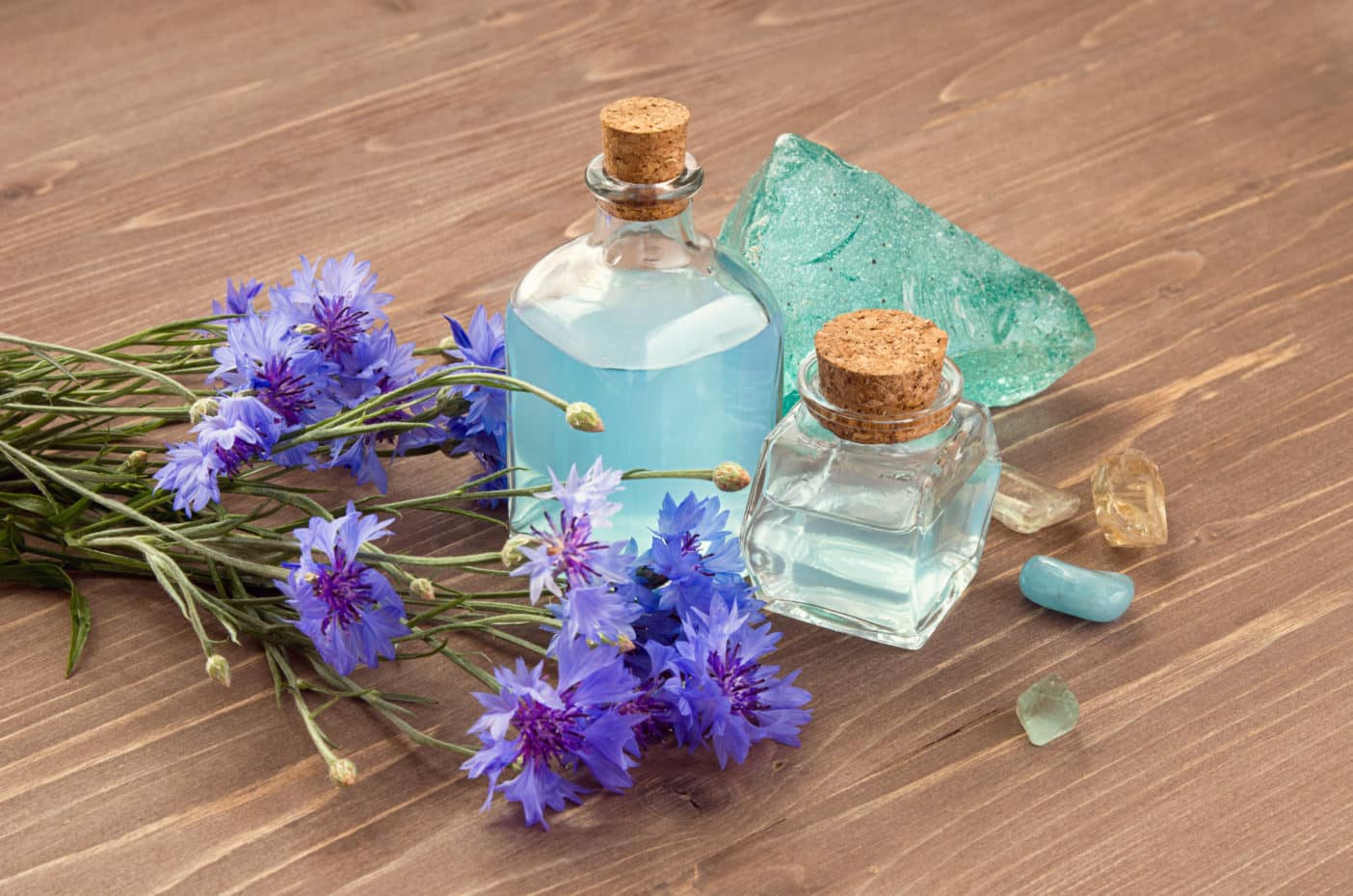Plant Hydrolates

Plant hydrolates are also known as the ‘mild sisters’ of essential oils. They are highly effective, but have been forgotten in favour of essential oils. Plant hydrolates are particularly suitable for sensitive and older people as well as pregnant women and children, as they are considered to be particularly gentle. But what exactly are hydrolates?
Plant hydrolates: natural co-products with a wide range of effects
Hydrosols are floral or plant waters that are produced by steam distillation during the extraction of these essential oils. Plant hydrolates are therefore co-products, so to speak. We can visualise this as follows: During water vapour distillation, water vapour moves through plant material. It then cools down and becomes liquid again. The aqueous solution that remains is called hydrolate. It is water that has first travelled through the plant material in vapour form and then cooled down. The essential oil floats on the surface of the solution. It can now be skimmed off. While the volatile and fat-soluble ingredients of the plant are collected in the essential oil, the plant hydrolates contain the water-soluble ingredients. The mode of action of the plant hydrolates is always based on that of the essential oil. Take lavender essential oil, for example, which has a calming and disinfecting effect. Lavender plant hydrolates also have such an effect, although they are somewhat milder.
Plant hydrolates were already used by the Romans, Egyptians and Greeks. The distilled plant material has a high concentration of valuable ingredients and is characterised by an intense fragrance. However, it is important to ensure that the quality is impeccable in order to avoid contamination. Compared to essential oils, plant hydrolates are more susceptible to germs as aqueous solutions. Plant hydrolates should therefore always be stored in a dark and relatively cool place. Products containing plant hydrolates are often offered in packaging units with a spray head, as this ensures a lower oxygen supply to the container. However, a milky-cloudy hydrolate does not mean that the product is spoilt. On the contrary: milky plant hydrosols contain more active ingredients, which means that they are more concentrated.
Ethanol can be used to extend the shelf life of pure plant hydrolates. Only ethanol from sustainable organic alcohol production is used in the production of the ethanol solution. It is recommended to avoid the use of other additives and instead to ensure consistently high standards in the production and storage of plant hydrolates.
Plant hydrolates in cosmetics
Plant hydrolates provide the skin with the effect that the respective plant can also offer. Their areas of application include bath additives, facial tonics, refreshing sprays, room fresheners and aromatherapeutic applications. They can be used pure or integrated into cosmetic formulations. They are also suitable as cooling compresses for sunburn, inflammation, minor wounds and sports injuries.
Plant hydrolates can also be used as a complete water substitute, which significantly increases their natural cosmetic character and enhances their beneficial effect. Plant waters are often also available as upcycling substances and are therefore used in food production, for example. The advantage of the effect, including sustainability, can be effectively marketed with plant hydrolates.
Some of the best-known and most effective plant hydrolates are presented below:
Neroli hydrolate
INCI: Citrus Aurantium Amara Flower Water
CAS number: 8016-38-4
EINECS number: 277-143-2
Alternative name: Orange blossom hydrolate
Description: a clear, colourless liquid
Possible uses: for facial toners, after-sun products, as a water phase in creams for mature skin and as a base for after-shaves
Main ingredients: linalool, alpha-terpineol, cis-phytol
Neroli hydrolate is a delicately scented floral water obtained from the distillation of white bitter orange blossoms. It has a germicidal effect and is therefore often used to treat skin irritations, acne and inflamed skin. As neroli plant hydrolates also have a decongestant, cooling and soothing effect, they are particularly suitable for use as a compress or facial toner. Neroli hydrolate is also known to support the skin’s regeneration process.
Rose hydrolate
INCI: Rosa Damascena Flower Water
CAS number: 90106-38-0
Possible uses: as facial toner, body spray, for emulsions and creams, as mouthwash for fresh breath
Main ingredients: vitamin B, vitamin C, pectins, tannins
Pure rose hydrolate is suitable for all skin types. It neutralises the pH value (good for sensitive skin), has an antibacterial and anti-inflammatory effect (ideal for blemished skin), provides dry skin with sufficient moisture and mattifies oily skin. Mature skin also benefits from rose water, as it prevents free radicals and can plump up wrinkles. Anyone suffering from rosacea will appreciate the toning and astringent effect of rose plant hydrolates. The scent of rose water has a relaxing effect and helps with inner restlessness. Sitz baths relieve discomfort after an episiotomy and in the case of haemorrhoids.
Peppermint hydrolate
INCI: Mentha Piperita (Peppermint) Leaf Water
CAS number: 84082-70-2
EINECS number: 282-015-4
Possible uses: as a body and face spray, shaving lotion and facial toner as well as after-sun care
Peppermint water has a clarifying and cooling effect. It cares for blemished skin, refreshes tired and heavy legs and can even relieve mild headaches. On hot days or after sunbathing, it provides a soothing freshness boost. Peppermint plant hydrosols can also promote concentration in stressful situations or when driving, for example.
Rosemary hydrolate
INCI: Rosmarinus Officinalis (Rosemary) Floral Water
CAS number: 84604-14-8
EINECS number: 283-291-9
Applications: as facial toner especially for oily skin, for hair care products
Rosemary hydrolate plays an important role in aromatherapy as it has a revitalising and stimulating effect. In cosmetics, it is particularly suitable for the care of oily and blemished skin and for high-quality shower gels. However, it can also be used in hair care as it stimulates the scalp and is even said to counteract hair loss. Oily hair is gently and thoroughly cared for with rosemary hydrolate.
Birch hydrolate
INCI: Betula pendula water
Most important ingredients: flavonoids, potassium, tannins and bitter substances, resin, saponins
Possible uses: for skin and hair care
Birch hydrolate is rich in electrolytes, glucose and plant acids. For this reason, athletes like to use it as an isotonic drink. It also has antibacterial, antiviral, antimicrobial and anti-inflammatory properties. Scalp massages with birch hydrosol can help against hair loss, dandruff and eczema. Impure skin becomes cleaner and clearer with regular use of facial toner with birch hydrosol. Dry and barrier-damaged skin, on the other hand, benefits from the protective and moisturising properties. Birch hydrosol also has a collagen-stimulating and slightly brightening effect.
Cucumber hydrolate
INCI: Cucumis Sativus Fruit Water
Cucumber hydrolate has an antioxidant effect and clarifies the skin. It tightens the pores and refreshes. When used regularly with a suitable toner, the skin looks smoother and firmer. The ingredients also have a decongestant effect, which means that cucumber hydrosol is particularly helpful for a swollen eye area.
Sandalwood hydrosol
INCI: Santalum album Wood Water
Sandalwood hydrosol has a very warm and sensual fragrance. It has a cell-renewing and slightly sweat-reducing effect and is very suitable for anti-ageing products. Sandalwood hydrosol is also ideal for the care of blemished and oily skin. Rubbing with sandalwood hydrosol provides relief from muscle tension.
Orange hydrosol
INCI: Citrus Aurantium Water
Orange hydrosol is characterised by a delicate floral fragrance. It has a tension-relieving, calming and balancing effect. This is why it is often used for so-called good-mood sprays, i.e. body sprays that relieve tension in stressful situations and thus contribute to mental well-being. In cosmetics, orange plant hydrolates are mainly used to firm the skin. They also have a slight whitening effect.
Disadvantages of hydrolates
Although plant hydrolates offer many advantages in cosmetics, there are also some potential disadvantages to consider:
Differences in quality are an important factor. The quality of plant hydrolates can vary depending on the manufacturing process, raw material quality and storage conditions, which can affect consistency and effectiveness.
Furthermore, plant hydrolates may contain allergens that can trigger reactions in sensitive skin, even though they are generally considered gentler than essential oils.
Another disadvantage is that the fragrance of plant hydrolates can evaporate more quickly compared to conventional perfumes or fragrance oils. This means that the fragrance impression in the cosmetic product can change more quickly, which could mean that the desired fragrance is not as long-lasting as with conventional perfumes or fragrance oils.
Plant hydrolates in sophisticated cosmetics from Cosmacon
Due to their low fat content and natural ingredients, plant hydrolates can be used in many different ways in cosmetics. The possible applications and modes of action are basically orientated towards the original plant. In principle, however, almost any application is conceivable, from use as a cleansing tonic to use as an aftershave to use as a body spray. If you are interested in the numerous benefits of the various plant hydrolates, we will of course be happy to advise you. Of course, we also offer you our support in the development of high-quality cosmetic formulations with plant hydrolates on request.
Sources:
Rose Flowers-A Delicate Perfume or a Natural Healer?; Biomolecules. 2021 Jan 19;11(1):127
Plant hydrolates – Antioxidant properties, chemical composition and potential applications.; Biomed Pharmacother. 2021 Oct;142:112033.
